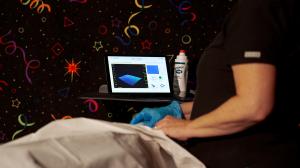Bexa™ Project Expands Breast Cancer Screening Access in Rural Texas
The Bexa™ Project, part of the Access to Breast Health for Texans initiative, is helping close this gap by bringing advanced breast cancer detection technology to medically underserved communities.
“Sometimes in life, we go through trials and tribulations, and we don't understand why,” Tamara Alexander, TTUHSC Laura W. Bush Institute for Women’s Health project manager and breast cancer survivor, said. “But maybe my cancer journey was meant to be so I could be on this side of that mountain and help other women.”
Alexander, along with her team in Abilene, Texas are working to bring the Bexa™ device, a portable and radiation-free elastography tool, directly to women in rural communities. The device, which resembles a computer mouse, uses low-frequency vibrations to detect and map areas in the breasts that may be harder or less elastic than surrounding tissue — a key early indicator of potential breast cancer.
The Bexa™ Project is helping women in rural communities around Abilene access vital early-detection exams at no cost. Many rural women face significant challenges in accessing breast cancer screenings, including long travel distances, time constraints and financial limitations.
Kathy Wood, a Fisher County resident, described her experience with the Bexa™ exam as “fast, easy, nice and warm, no pain,” adding that it only took 15 minutes and was well worth the 10-mile drive.
Alexander emphasized that Bexa™ is not a replacement for mammograms, but rather a complementary tool that encourages women to take control of their breast health. “Bexa™ and this program really do help find suspicious material in women’s breasts at an early stage and can help save lives very easily,” Alexander said.
For those who require further imaging or treatment, the Bexa™ Project also provides resources for follow-up care, including telehealth consultations.
Tadie Nowlin, a Roby resident, shared her gratitude for the exam. “It was nice for her to tell me right away that everything was fine. I did learn that I had some dense breast tissue, and it was nice that this machine can help see more underneath that. I will share that with my PCP, just because I haven't had a mammogram.”
Alexander said the Bexa™ Project is having a monumental impact, offering women not only the peace of mind that comes with early detection but also the resources to continue their care if needed.
“When they leave, just the look of relief on their face and the results as they walk out the door are monumental,” Alexander said. “We’ve put a lot of women’s minds at ease when they’ve left the exam site.”
Abilene area residents can learn more about the Bexa™ Project and find screenings locations across 24 counties served by the Hendrick Hospital system by contacting Alexander at tamara.alexander@ttuhsc.edu or visit https://qr.bexaequityalliance.org/atbhtmembers/.
For statewide information about breast cancer screenings, visit HealthyTexasWomen.org.
-30-
Suzanna Cisneros
Texas Tech University Health Sciences Center
+1 806-773-4242
email us here
Legal Disclaimer:
EIN Presswire provides this news content "as is" without warranty of any kind. We do not accept any responsibility or liability for the accuracy, content, images, videos, licenses, completeness, legality, or reliability of the information contained in this article. If you have any complaints or copyright issues related to this article, kindly contact the author above.
Custom Trade Show Exhibits: Redefining Brand Engagement at Global Events
FLEOA Statement on H.R. 4944
Growing at 26.5% CAGR | Public Key Infrastructure Market Reach USD 14.49 Billion by 2030 Globally
Więcej ważnych informacji
 Jedynka Newserii
Jedynka Newserii

 Jedynka Newserii
Jedynka Newserii

Konsument

Polacy nie korzystają z hossy trwającej na warszawskiej giełdzie. Na wzrostach zarabiają głównie inwestorzy zagraniczni
Od października 2022 roku na rynkach akcji trwa hossa, nie omija ona także warszawskiej giełdy. Mimo to inwestorzy indywidualni odpowiadają zaledwie za kilkanaście procent inwestycji, a o wzrostach decyduje i na nich zarabia głównie kapitał z zagranicy. Widać to również po napływach i odpływach do i z funduszy inwestycyjnych. Zdaniem Tomasza Koraba, prezesa EQUES Investment TFI, do przekonania Polaków do inwestowania na rodzimej giełdzie potrzeba zysków z akcji, informacji o tych zyskach docierającej do konsumentów oraz czasu.
Polityka
Obowiązek zapełniania magazynów gazu w UE przed sezonem zimowym ma zapewnić bezpieczeństwo dostaw. Wpłynie też na stabilizację cen

Unia Europejska przedłuży przepisy z 2022 roku dotyczące magazynowania gazu. Będą one obowiązywać do końca 2027 roku. Zobowiązują one państwa członkowskie do osiągnięcia określonego poziomu zapełnienia magazynów gazu przed sezonem zimowym. Magazyny gazu pokrywają 30 proc. zapotrzebowania Unii Europejskiej na niego w miesiącach zimowych. Nowe unijne przepisy mają zapewnić stabilne i przystępne cenowo dostawy.
Infrastruktura
Gminy zwlekają z uchwaleniem planów ogólnych zagospodarowania przestrzennego. Może to spowodować przesunięcie terminu ich wejścia w życie

Reforma systemu planowania i zagospodarowania przestrzennego rozpoczęła się we wrześniu 2023 roku wraz z wejściem w życie większości przepisów nowelizacji ustawy z 27 marca 2003 roku. Uwzględniono w niej plany ogólne gminy (POG) – nowe dokumenty planistyczne, za których przygotowanie mają odpowiadać samorządy. Rada Ministrów w kwietniu br. uchwaliła jednak ustawę o zmianie ustawy z 7 lipca 2023 roku, a jej celem jest zmiana terminu obowiązywania studiów uwarunkowań i kierunków zagospodarowania przestrzennego gmin na 30 czerwca 2026 roku. Wskazana data może nie być ostateczna z uwagi na to, że żadna z gmin nie uchwaliła jeszcze POG.
Partner serwisu
Szkolenia

Akademia Newserii
Akademia Newserii to projekt, w ramach którego najlepsi polscy dziennikarze biznesowi, giełdowi oraz lifestylowi, a także szkoleniowcy z wieloletnim doświadczeniem dzielą się swoją wiedzą nt. pracy z mediami.









.gif)

 |
| |
| |
|